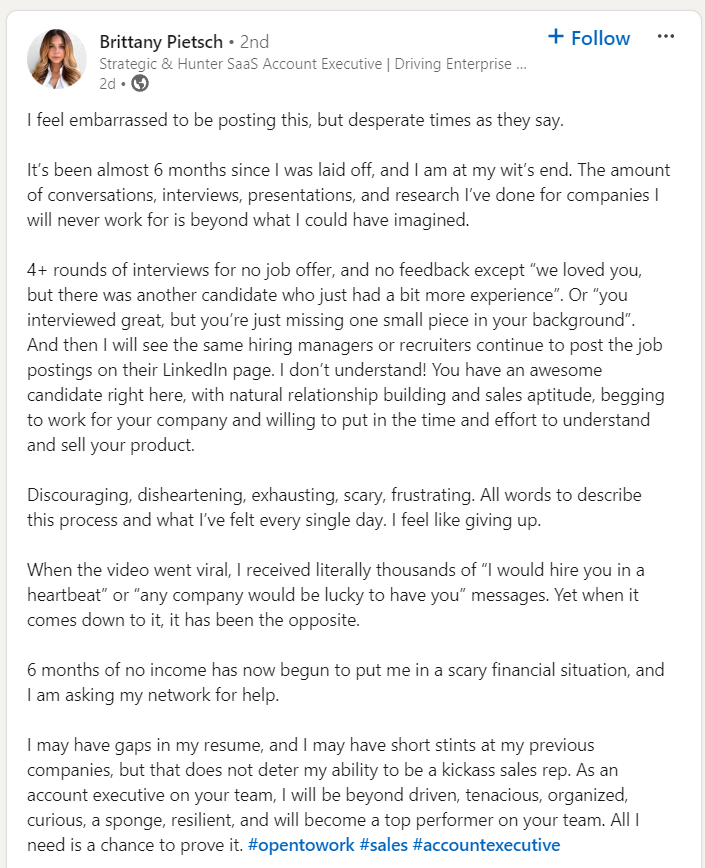Should You Share Your Layoff Story Online? Think Twice First
Sharing your layoff story on social media can be cathartic but may have long-term career consequences. This guide weighs the pros and cons to help you decide.
Getting laid off can be a devastating experience that upends your life and sense of self, and in our age of digital transparency, sharing vulnerable experiences like job loss on social media has become increasingly common. Posting about your layoff can feel like a way to process your emotions, seek support, and even find new opportunities.
But before you hit "share" on that heartfelt post or video you just recorded, it's wise to consider both the potential benefits and the risks. While sharing can be cathartic in the short-term, viral layoff stories can also have unforeseen long-term consequences for your career and reputation.
The Case for Sharing Your Layoff Story
When you're reeling from the shock and pain of a layoff, posting about it on social media can offer some key benefits:
1. Emotional catharsis and community support
After losing a job, it's natural to feel a range of intense emotions like anger, shame, fear and grief. Sharing those vulnerable feelings with your online community can provide a release. It allows you to claim your narrative and reduces the isolation of going through hardship alone. The likes, comments and messages of support in response can be deeply validating and comforting.
2. Tapping into your network for job leads
Posting about your layoff lets your network know you're open to work. Colleagues, acquaintances, friends and family want to help—they may know of job openings, have connections to hiring managers, or be able to make intro emails. Broadcasting your availability opens the door to leads you wouldn't get otherwise. I've seen many examples of people landing interviews and offers thanks to their 'I got laid off' post.
3. Showing authenticity and reliability
There can be a tendency to only post curated highlight reels of our careers. Being transparent about setbacks like layoffs is vulnerable and brave. It makes you relatable as a human, not just a professional. People connect with that authenticity. Some of the most inspiring thought leaders are open about their winding paths and stumbling blocks. Your story of navigating this challenge may resonate with and even help others.
The Risks of Posting About Your Layoff Experience
The most beneficial approach is to allow yourself a day or a few days to come to terms with the situation. Layoffs can be stressful regardless of the reason behind them, and it's important to give yourself time to process the impact they have on you.
While there are benefits to sharing, it's crucial to also weigh the potential downsides before posting about your layoff:
1. Viral posts can haunt your career indefinitely
In the digital age, nothing is truly temporary. That cathartic layoff post could go viral and follow you for years. When a potential employer Googles you, it may be the first thing they see. Fair or not, they may make negative assumptions about your professional conduct, resilience, or discretion. Some hiring managers perceive "airing dirty laundry" as a red flag when assessing candidates.
2. Badmouthing past employers may give you a "problem" reputation
It's understandable to feel angry at the company that let you go. But publicly disparaging your past employer, even if your feelings are valid, can backfire. Future hiring managers may worry you'd do the same to them. They may assume there are two sides to the story and see you as a risky hire. Even if you're careful not to name the company, the overall tone matters. Communicating bitterness or victimhood won't serve you in the long run.
3. Social media sympathy doesn't guarantee a new job
It's comforting to get an outpouring of support when you share your layoff. But likes and kind comments don't always translate into concrete job offers. Hiring managers still assess your qualifications, interview presence, and cultural fit. An initial "we should talk!" can fizzle out if you're not the right match. Counting on a viral post as a shortcut to your next opportunity sets you up for disappointment. Effective job searching takes targeted, proactive, and persistent effort.
4. Being in a small market amplifies the impact of what you share
In tight-knit industries or small communities, your name travels fast, and so does gossip. Posting about your layoff experience can quickly become the talk of the town, for better or worse. Colleagues, competitors, and potential employers in your field will likely hear about it. While some may offer support, others might use it as a basis for speculation or judgment. This visibility can affect not just your immediate job prospects but also your long-term reputation within your professional circle. Being mindful of the local industry's culture and the potential for widespread gossip is crucial when deciding to share your story publicly.
A Cautionary Tale: Brittany Pietsch's Viral Layoff TikTok
To illustrate the potential pitfalls of posting about your layoff, let's look at a recent high-profile case. In January 2023, TikToker Brittany Pietsch shared a video of her layoff from tech company Cloudflare. The video quickly went viral. To date, it's been viewed over 1.2 million times on TikTok and millions more across news and social media outlets.
Source: WhatLayoff
The video sparked heated debates about Cloudflare's layoff practices and Pietsch's decision to post such a raw, personal moment. Many viewers flooded her comments with support, promising job offers and hailing her bravery.
However, six months later, Pietsch reported still struggling to find employment, despite her newfound online fame.

Pietsch's story is a poignant reminder that going viral is not a magic bullet for landing a new job. While I deeply empathize with her pain and respect her transparency, her experience illustrates the limitations of social media support in the face of real-world hiring practices.
Many who claimed "I would hire you in a heartbeat!" likely meant it earnestly in the moment. But when it comes to actual recruiting, most managers are understandably wary of candidates who publicly bash past employers, regardless of the situation.
Pietsch's struggle also highlights how a single social media post can come to define your online presence and professional brand. Despite her other accomplishments, too many, she is now primarily known as the "Woman from Cloudflare's layoff video." It's a label that may give hiring managers who Google her unfair pause, even years later.
To be clear, I'm not sharing Pietsch's story to disparage her choices, but to paint a realistic picture of potential long-term consequences. Pietsch's feelings about her layoff are valid and her pain is real. There's nothing wrong with authentic self-expression.
But it's worth considering: is it worth the tradeoff of a fleeting dopamine hit of virality for a more curated, enduring professional reputation? There's sadly no easy answer, but it's a question worth grappling with before clicking "post."
Another important factor to consider is the impact this video may have on your mental well-being, as not everyone is prepared for this level of attention, as Pietsch also discovered. My only hope is that she secures a good job at a reputable company, and that the "Cloudflare layoff story" has no negative effect on her career.
Claim your FREE copy of the ChatGPT Prompts for Job Seekers guide now!
I regularly offer job search advice on LinkedIn, so make sure to FOLLOW me for weekly updates.
When Oversharing Works - The Rare Exception, Not The Rule
While most viral layoff posts don't lead to dream jobs, there are rare exceptions. Maddie Machado's story is one such outlier that proves the rule. In March 2023, Machado made news headlines by posting on Instagram that she earned $190,000 at Meta while doing "nothing" for months before being let go. Her posts about her cushy recruiting job and dismissal as part of mass tech layoffs went viral, getting picked up by major outlets.
Source: TikTok
But rather than fading into post-virality obscurity, Machado leveraged her 15 minutes of fame into a lucrative career pivot. She quickly built a TikTok following by dishing out job search tips and capitalizing on her reputation. Within months, she was earning 6 figures per month as a content creator, teaching others her unconventional career hacks.
Machado's story may sound like a fairy tale ending to a layoff nightmare. Certainly, many who post about their layoffs hope to spin buzz into opportunity like she did. But Machado's case is very much the exception, not the template. For every Maddie Machado, there are thousands of Brittany Pietsches who go viral without material gain. And many more who post, don't go viral, and must deal with the professional aftermath either way.
It's also critical to recognize that Machado didn't just get lucky - she already has a significant following on TikTok and proactively made strategic choices to package her story into an attention-grabbing personal brand and monetize it.
Finally, even for those with the drive and savvy to become professional influencers, it's a precarious path. Social platforms are notoriously fickle - algorithm changes or new policies could tank your view counts or get you deplatformed entirely. Basing your whole livelihood on TikTok is not for the faint of heart.
So while Machado's layoff post catapulted her into an undeniably successful career, it's not a reliable roadmap for everyone. For most, the potential halo of going viral doesn't outweigh the risks of reputational damage with future employers.
Key Takeaways
Give yourself time to process complex emotions before posting anything about your layoff publicly. What feels cathartic in the moment may not serve you long-term.
Weigh potential short-term benefits like emotional release and job leads against long-term risks to your professional reputation. A viral post now could shape how employers see you for years.
Social media fame is fickle and doesn't replace the hard work of job searching. Likes and supportive comments don't guarantee job offers. Focus on developing in-demand skills and cultivating a strong network.
If you do decide to share, emphasize telling your story with dignity. Aim to come across as resilient and insightful rather than bitter or reactive. Never publicly disparage your former employer.
Should You Share Your Layoff Story Online?
Ultimately, the decision to share your layoff experience on social media is a deeply personal one with no clear right answer. We each have to weigh the catharsis and community support against the potential career consequences based on our own situations and risk tolerance.
As always, in every article I write, I aim to present an objective look at both sides to help inform your choice. But you don't need to navigate this challenge alone. Lean on trusted friends, family, and mentors outside of social media for support and advice.
Above all, remember that your worth is not defined by your employment status or your clout online. Layoffs are, sadly, common and rarely a reflection of your talent or character. With self-compassion, strategic networking, and persistence, you will find your way to the next chapter.
Focus on your healing first. Update your resume, practice interview skills, and search for jobs that excite you. Find strength in your loved ones and passions outside of work. And when you land that great new role, share a celebratory post if you want! Wishing you all the best on the journey ahead.
Share this article or ANY other article to unlock exclusive premium content (guides, strategies, insights) behind a paywall. Discover how to do it here!
How To Announce On LinkedIn That You Were Laid Off with ChatGPT Prompt
Announcing a layoff on LinkedIn has become a common practice. However, crafting the right message can be challenging.
Here are four effective ways to announce your layoff on LinkedIn, along with ChatGPT prompts to help you create these announcements:




